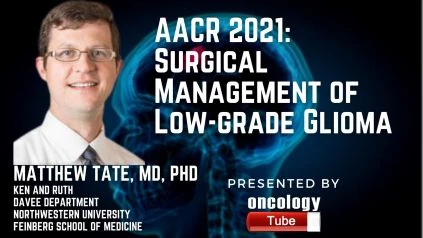Matthew Tate, MD, Ph.D., Associate Professor of Neurological Surgery and Neurology – Ken and Ruth Davee Department Northwestern University Feinberg School of Medicine speaks about Surgical Management of Low-grade Glioma.
Link to Press Release:
https://www.astrazeneca.com/media-centre/press-releases/2021/astrazeneca-accelerates-early-oncology-pipeline-across-key-strategic-scientific-platforms-at-aacr.html
During the simulated American Association of Cancer Research (AACR) Annual Meeting, 10 to 15 April 2021, AstraZeneca will discuss insights from the Company’s groundbreaking early oncology pipeline through various strategic channels.
The next-generation PARP1 selective inhibitor AZD5305, which will be unveiled in five presentations, demonstrates AstraZeneca’s dedication to developing therapies that selectively destroy cancer cells by attacking the mechanism that cells rely on to repair DNA harm. Furthermore, studies presented in several sessions would demonstrate new innovations that allow for the early diagnosis of disease recurrence, allowing for earlier treatments for patients that are more likely to recover from therapy.
Data from more than 40 presentations will be used to highlight advances with the next generation of anticancer drugs, new ideas into targeting therapy resistance, and methods that are advancing cancer patient personalization.
The Orchestrated Immune Response: Dynamic Forces Guiding Cancer Immunity, a Spotlight Theater Presentation by the Company, will introduce a novel paradigm for understanding the role of the immune system in cancer, with the ability to reshape the way scientists produce medicines to combat tumor development.
Two educational symposia will be attended by AstraZeneca executives:
– Evolving Diagnostic Approaches, Understanding of Replication Stress, and Resistance Mechanisms to DDR Targeting Therapies (Session #ADT04), with a focus on targeting the replication stress response, which happens when the genome is subjected to stresses that hinder DNA replication.
– Developments in Drug Delivery (Session #ADT08), which will focus on the breakthroughs and technologies that are driving the growth of the next generation of antibody-drug conjugates.
The following are some of the main presentations:
– The structure of AZD5305, a next-generation PARP1 selective inhibitor, has been revealed, as well as key preclinical results.
– The launch of AZD8853, a new antibody that targets GDF15 and is used to treat tumors that are resistant to immunotherapy.
– Findings from the HUDSON Phase II experiment, which used deep learning algorithms on pathological photographs to distinguish characteristics consistent with non-small cell lung cancer patients progressing on immunotherapy.
– A pooled study of interstitial lung disease evidence from eight cancer studies in patients treated with Enhertu
– Two talks about genome-wide CRISPR screens that found the Hippo pathway to be a key driver of resistance in EGFR-mutated lung cancer and BRAF-mutated colon cancer.
– Information on a novel immunosuppressive myeloid gene signature that could be used to create clinical biomarkers
– Findings from the ATRiUM Phase I experiment, an independently funded study testing ceralasertib, an ATR receptor, and gemcitabine as a biliary tract cancer combination therapy.

